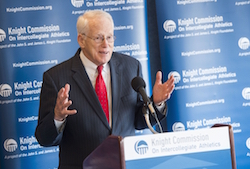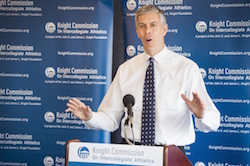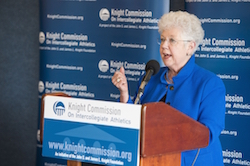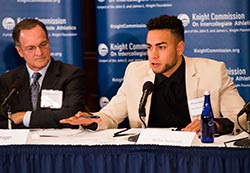Related links:
- Knight Commission Applauds New NCAA Policy to Reward Schools for Meeting Academic Expectations, October 2016
- Financial Incentives Tied to Academic Success (Illustration created in 2020 to describe changes)
Media contact: Amy Perko
perko@knightcommission.org
910.551.6809
Gabe Feldman paper on non-game related name, image, likeness payments: Link here.
Video of Amateurism/Name, Image, Likeness: Link here
Additional photos and videos are below the release
Washington, D.C – The Knight Commission on Intercollegiate Athletics met today at the National Press Club and called for the NCAA to establish a new guiding principle for the use of NCAA revenues distributed to institutions from the March Madness tournament. The Commission recommended that 100 percent of NCAA revenues received by institutions should be restricted to supporting athletes’ education and providing them with appropriate health and safety benefits and protections. Under current guidelines, just 25 percent of NCAA revenues received by institutions are restricted to support athletes’ education and provide other benefits.

In addition to this recommendation, the Commission affirmed its strong support for altering the incentives in the NCAA’s revenue distribution plan to reward academic outcomes and not just athletic outcomes—a longstanding Knight Commission proposal that has gained new momentum from a preliminary report issued last week by a special NCAA Values-Based Revenue Distribution Working Group. At present, nearly 40 percent of the more than $540 million in NCAA revenues annually distributed to Division I institutions is based on the appearances and success of teams in the men’s basketball tournament.
Knight Commission Chair William E. “Brit” Kirwan said, “The NCAA’s revenue distribution policies haven’t fundamentally changed in a quarter century, even though the revenues have expanded dramatically. We applaud the NCAA for considering changes that, for the first time, would allocate some NCAA revenues to institutions based on the academic outcomes of college athletes. But the Commission also believes there is a real opportunity now to make more sweeping changes. We recommend that the use of all funds institutions receive from the NCAA be restricted to support athletes’ education and to provide them with appropriate health and safety benefits and protections.”

New Knight Commission Co-Vice Chair Arne Duncan said, “It is not only important that the NCAA set a clear and high bar as a matter of principle for use of the revenues it distributes but that it act as soon as possible to do so, especially as NCAA revenues from March Madness escalate dramatically over time in the new tournament contract. Those revenues should be used by institutions to directly support the education and medical care of college athletes—not for coaching salaries, recruiting, and building more athletics facilities.”
The Knight Commission suggested that the NCAA’s current financial reporting system could be easily modified to implement the Commission’s recommendation, which would enhance transparency and accountability for institutional use of NCAA funds.
The Commission welcomed last week’s NCAA working group report, which was sent to Division I institutions for feedback. Among other options, the NCAA working group report includes the concept of awarding a portion of the money to schools for academic success, by using increases in the NCAA’s March Madness media rights agreement to create a new “academic achievement” fund. Under the model, the fund would phase in slowly but have significant effects on revenue distribution over time. By 2032, the end of the current media rights contract, funding awarded to institutions from the new academic achievement fund would nearly match the amount awarded to institutions based on men’s basketball tournament appearances and wins.

Knight Commission Co-Vice Chair Carol Cartwright said, “The Commission strongly supports the NCAA working group’s concept of creating an academic achievement fund and applauds the leadership of task force co-chairs Christine Copper and William Ruud. Financial incentives must change to align with the enduring values of college sports.”
The Commission urged Division I presidents to express their support for making this shift to rewarding academic outcomes in their feedback to the NCAA working group.
The Commission’s recommendation that 100 percent of NCAA revenues received by institutions be restricted to educational or health and safety purposes establishes an important principle— national shared revenues received by institutions must be devoted to athletes’ education and health and safety benefits and protections. Knight Commission Chair Brit Kirwan said, “Establishing this principle to restrict the use of NCAA revenues is important to the financial integrity of college sports. We will be exploring the potential application of this principle, in whole or in part, to the use of other shared athletics revenues.” For example, the Commission has previously recommended that a portion of revenues from the $500 million College Football Playoff be used to support concussion research and other health and safety issues for athletes.
During its spring meeting, the Knight Commission heard presentations from experts and former athletes on several issues that the members regard as paramount for the NCAA and member institutions in the administration of intercollegiate athletics going forward.
The health and safety imperative
Sports medicine professionals discussed recent changes implemented by institutions and conferences to improve medical care and address ongoing health and safety challenges. Former football players Kevin Glover, J.C. Watts, and Marcus Lattimore called for increased attention to and post-enrollment coverage of medical conditions and injuries that resulted from participation in college sports.
The panel reinforced the urgent need for more financial resources, increased medical staffing, and more qualified and educated coaches, particularly strength and conditioning coaches.
Amateurism discussion

The meeting also featured a panel examining NCAA amateurism rules and potential changes. Gabe Feldman, associate professor of law and director of the Sports Law Program at Tulane University, proposed a model that would eliminate some of the current restrictions on college athletes using their names, images or likenesses (NIL) for financial gain. Feldman argued that a new system that permits “non-game” related NIL payments, such as commercial endorsements, would not “unduly interfere with the NCAA’s core goals” and that these changes are more appropriate for college sports than a “pay for play” model.
Former Stanford football player Rollins Stallworth, who has served as chair of the Pac-12 Student-Athlete Advisory Committee, expressed support for the proposal.
Feldman’s proposal would require a new compliance and enforcement system. Joel Litvin, a former NBA executive, discussed the NBA’s strict rules for player endorsements to prevent salary cap manipulation for its 30 teams. Professional leagues’ salary caps, and related rules and rigorous enforcement, are in place to maintain competitive balance. Litvin and another expert panelist, law professor Stephen Ross, said opening up player endorsement opportunities for college athletes will likely generate major enforcement challenges but that there are potential enforcement alternatives that could help mitigate those challenges.
The Knight Commission agreed to continue to explore these complex issues, recognizing that such endorsement opportunities might exist for only a small percentage of the more than half-a million college athletes.
Photos of the public sessions are available below and HERE
Video of these sessions are available: Session 1 (health & safety issues), Session 2 (amateurism and discussion of proposed non-game related name, image and likeness model)
White Paper presented by Gabe Feldman to the Knight Commission available HERE
Athletic Time Demands on College Athletes
The Commission also discussed actions being taking by the NCAA to reduce athletic time demands, a Commission priority. Recent NCAA research, drawing on more than 44,000 responses from Division I athletes, identifies a number of potential reforms. The Knight Commission reiterated its strong support for proposed changes being considered, like requiring mandatory no-activity periods at the end of competitive seasons, post-travel rest periods from athletically-related activities, and requiring two days off per week out-of-season.
The Commission also supports changing NCAA rules to pause the current “athletics eligibility clock” for any student who takes time away from athletics for a study abroad or internship experience.
Knight Commission member and former University of Florida basketball player Sarah Lowe said, “It is encouraging to see that real changes are on the horizon. The NCAA study confirms what we’ve known for a long time—college athletes want more time to focus on their academic work and pursue opportunities, including internships, study abroad programs, and career development.”
Efforts to improve financial transparency
The Commission announced that it has updated its Athletic & Academic Spending Database for NCAA Division I to include the most recent data from the 2013-14 academic year. The data shows that among schools that compete in the NCAA Football Bowl Subdivision, the five-year growth rate for academic spending per student is up only 4 percent, while institutional subsidies for athletics per athlete have jumped 41 percent. The database can be accessed at spendingdatabase.knightcommission.org.
New members
This meeting was the first for new members Arne Duncan, former U.S. secretary of education; Anna Spangler Nelson, chairman of the Spangler Companies and member of the University of North Carolina Board of Governors; and Paul Tagliabue, former commissioner of the NFL and member of the Georgetown University Board of Directors.
Kirwan also announced that Scott S. Cowen has been appointed to the Knight Commission. Cowen is president emeritus and distinguished university professor at Tulane University. Cowen served as Tulane’s 14th president from July 1998 through June 2014. TIME magazine named Cowen one of the nation’s Top 10 Best College Presidents, and he has received national recognition for guiding Tulane through its rebuilding after Hurricane Katrina devastated the city of New Orleans, including much of Tulane’s campus. Cowen has a long history of leadership in college sports, having helped to spearhead changes to the former Bowl Championship Series and having served on the NCAA Board of Directors and its Executive Committee.
About the Knight Commission on Intercollegiate Athletics
The Knight Commission was formed by the John S. and James L. Knight Foundation in October 1989 in response to highly-visible scandals in college sports. The Commission promotes reforms that support and strengthen the educational mission of college sports. Over the years, the NCAA has adopted a number of the Commission’s recommendations, including the rule that requires teams to be on track to graduate more than 50 percent of their players to be eligible for postseason competition. The Commission’s Athletic and Academic Spending Database provides financial data for more than 220 public Division I institutions, creating greater financial transparency on athletics spending.
About the John S. and James L. Knight Foundation
The Knight Foundation supports transformational ideas that promote quality journalism, advance media innovation, engage communities, and foster the arts. We believe that democracy thrives when people and communities are informed and engaged. For more, visit www.knightfoundation.org.
Videos: Session 1 (health & safety issues), Session 2 (amateurism)
Photos:
Photos available for public use (click on photos to enlarge)
